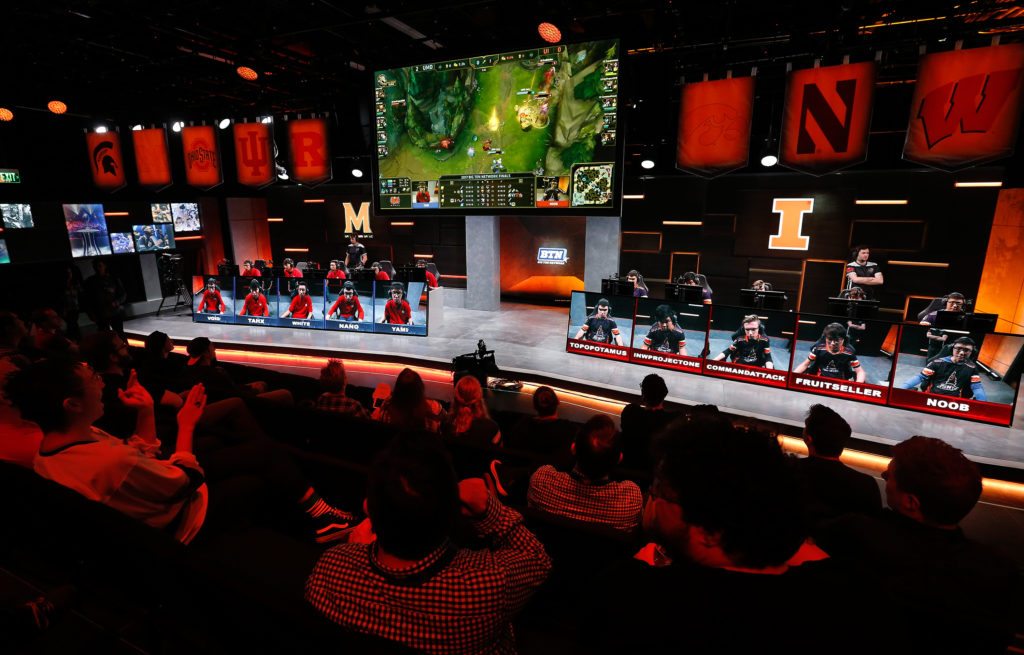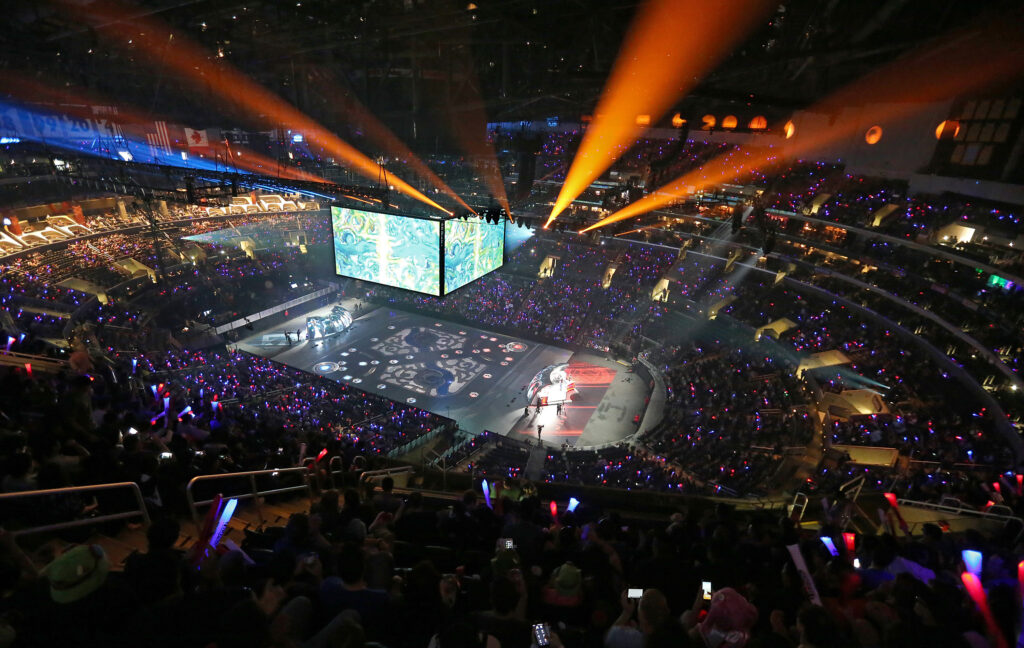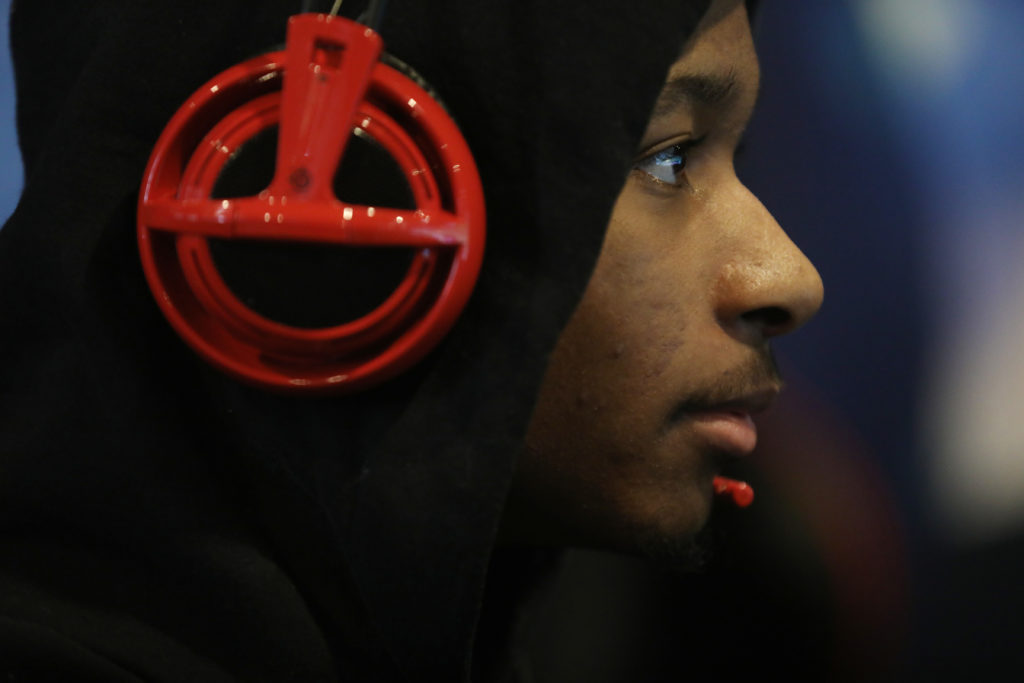Students are gaining scholarships and extra-curricular activity hours by offering a competitive skill that could help universities obtain funds. However, these students aren’t playing on a field, court or rink. Instead, they are playing video games.
Competitive gaming, known as eSports, is a growing trend in the collegiate world of entertainment arts. Although they may not be throwing a ball like the football team, they are putting in a similar amount of training.

Comparable to traditional sports, eSports holds regular competitions around the country, offers opportunities to lead teams and even has a recognized league, known as Major League Gaming.
While the world of eSports grows, it has a significant presence in Utah.
The University of Utah offers a program known as Entertainment Arts & Engineering which is a proponent of eSports and video game creation. The program was founded in 2007 as a collaboration between the Computer Science department and the Digital Media department.
Since the program’s inception, over 275 Master’s students have graduated. On top of the Master’s graduates, over 500 students have graduated with Entertainment Arts & Engineering as their undergraduate emphasis.
A portion of the department’s efforts are aimed towards eSports where students can obtain scholarships for joining certain competitive gaming teams.
Their goal is to “lead as thinkers, makers and players” while maintaining the nation’s leading team of collegiate eSports. The team wears jerseys, has nutrition and wellness coaches and behavioral trainers, similarly to the football team.
Although they may not be on a field, the eSports team has different “positions” for their team members that will lead them to potential success. These “positions” are not quarterback or pitcher, but, instead, where on the map a certain team member will play.
The eSports groups focus on four different games: “League of Legends,” “Overwatch,” “Rocket League” and “Hearthstone.”
“League of Legends” is the most popular of the featured games. In an interview with Polygon, Riot Games executives Marc Merrill and Brandon Beck claimed over 100 million different users play “League of Legends” each month.
With an international fanbase and a competitive feel, “League of Legends” players weigh in on why that certain game offers a unique experience.
“Jumping into a game like ‘League of Legends’ that was released years before, I definitely experienced competition,” said Alex Hernandez, “League of Legends” player. “It’s an extremely complex game so once you get used to playing it you want to get better and win as much as possible.”
While an aspect of video games is to have fun, eSports games, such as “League of Legends,” have the element of competition at their mental forefront.
“As you get better, you climb higher up the ranks and face tougher and tougher players,” Hernandez said. “It’s frustrating but the competition keeps you playing.”
“League of Legends” is a highly lucrative competition game for professional eSports participants. Top competitors can profit a substantial sum of money.
Those unfamiliar with eSports may be surprised to find out how much money brands are willing to pay for advertising during gaming events. They may also be astonished to discover that the top gamers are making millions of dollars for being the best players.
According to Business Insider, a projected $440 million will be spent in 2017 for professional eSports on sponsorships and advertising alone.
At eSports competitions, prize pools over $20 million are offered to the top gamers.

In August 2017, gamers’ top earnings were gathered and compared based on how much they had earned on eSport competitions alone. Some of the top earners had garnered over $2.5 million in winnings from “Dota 2” competitions.
Others had gained over $1.5 million in “League of Legends” competitions held worldwide.
Of the top ten players from Dota 2, only two were from the United States. Most of the world’s top eSports competitors hail from Asian countries like China, Japan or South Korea.
While the U.S. may not have the international competition cornered, their coverage of events is something new to the eSports world and the traditional sports world which has some critics hoping it stays a “demo.”
ESPN has been covering eSports for five years now, but has recently dedicated full-time reporting gaming events on their website.
“I’ve seen the video game thing on ESPN.com and I’m not always sure what to think of it,” Clay Richardson said. “I think it’s great that they will put video game coverage on the internet, but to put them next to football and basketball, it kind of makes me feel like anything is now a sport.”
These criticisms and others are not rare for eSports.
Some may criticize the eSports trend as being “an insult to traditional sports” or “an attempt to make everyone an athlete.” To those critics, the ESPN offers an interesting perspective.
eSports are listed on ESPN’s website as a featured category, right next to NFL, NBA or MLB. In 2015, ESPN began dedicating event coverage specifically to eSports.
“One of the things that ESPN has been successful at is finding areas that are important to fans and making sure that we get into that space,” said ESPN.com editor in chief Chad Millman in an interview with Time Magazine. “We did it with Fantasy (football, baseball, basketball, hockey) many years ago, and it’s become a huge tentpole in our coverage across television, across print, across digital, across audio.”
Another facet of eSports that fascinates gamers is the benefit it offers to the entertainment industry. Players can live stream their video game habits to viewers through programs like Twitch or Dailymotion Games.
As a gamer streams their virtual experiences on the internet, people can watch what actions are taken in the game and investigate if they want to invest their time into the displayed game.
“I know from experience that the entertainment businesses are benefiting greatly from competitive gaming,” Hernandez said. “There are teams and tournaments throughout the world for popular games and they are broadcasted out through websites like YouTube or Twitch. I don’t know why but there is something enjoyable about watching others, who are the best in the world, play your favorite games.”

The competition-driven aspect of video games may not appeal to the overall public, but gamers enjoy the drive.
“Why would competition be distracting? I love competition,” said eSports participant Erik Anderson, who plays “League of Legends.”
Whether you support eSports or not, their growth remains steady. It will be up to the gamers to determine if the trend levels up or suffers from lag.













